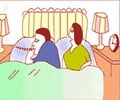New research reveals older animals display cellular changes in the brain clock that sets sleep and wakeful periods and explains why older people have sleep problems.

Consistent with previous studies, the researchers found aged mice showed disrupted sleep behavior and weakened brain network activity in the SCN. But Meijer and colleagues also found changes occurring in individual SCN cells, not just in their networks.
"In fact, the changes at the single-cell level were more severe than the changes at the network level," said Meijer. This represents a shift in understanding of aging's effects on the brain.
The researchers made electrophysiological recordings from isolated SCN neurons, a difficult experiment given the advanced age of the animals and the small size of this type of neuron. They found aged SCN neurons lack day-night rhythms in some membrane properties. In addition, the team identified age-related reductions of certain potassium currents that are important to the neurons' rhythmic firing.
Because potassium and other ion channels can be manipulated with drugs, "This work provides a new target for potential therapeutic interventions that can mitigate the age-related decline in the sleep-wake cycle," said Christopher Colwell, PhD, an expert in circadian clock function at the University of California, Los Angeles, who was not involved in the study.
Advertisement















